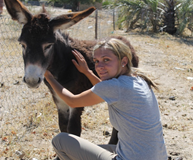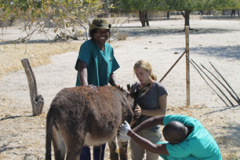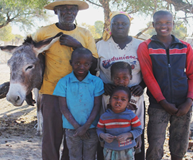(Equus africanus asinus)
Donkeys (Equus africanus asinus) are an integral and important part of daily life for many people in Botswana. Donkeys provide an affordable and accessible means of draught power, food production, foodstuffs, and transport, in particular for smallholder farmers. Despite these contributions, donkeys are marginalized and mistreated by people given their low status compared to other animals, in particular cattle.
Martha Geiger joined our research team as a Masters student in 2011 to investigate the welfare of donkeys in and around Maun in Ngamiland District, Northern Botswana. Martha's work highlights donkeys as a pivotal social group (drawing from animal geography) and bridges social science with animal welfare science methods to study both the donkeys themselves and the humans who interact with them. From May through August 2012, Martha conducted physical and emotional welfare assessments of 100 donkeys and interviewed their respective human owners on how they value, use and care for their animals. Local training, in-kind assistance and encouragement were provided by the Maun Animal Welfare Society (MAWS) and the Ministry of Agriculture veterinary and livestock extension services.
Martha successfully defended her research in April 2013 and her thesis was awarded the OP Dwivedi Prize for International Development at the University of Guelph. We have published manuscripts in a variety of venues, including those focused on veterinary science, geographical social theory, and international development. Martha returned to Maun in January 2014 to disseminate her research results in person to local communities and the MoA; she joined with MAWS to operationalize a donkey ear tag project funded by SPANA.




